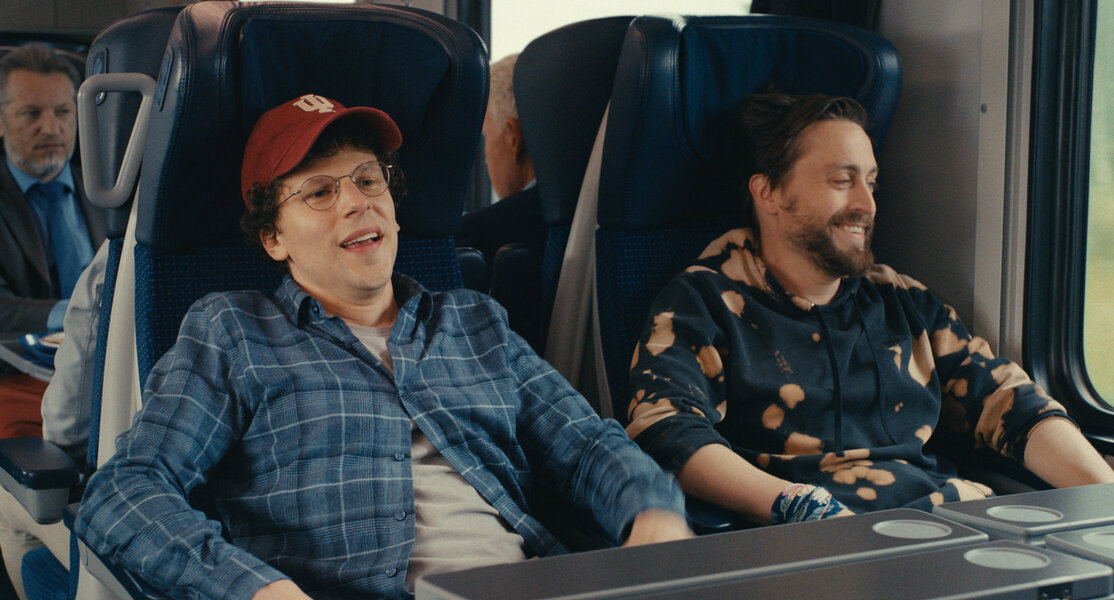Travel
‘A Real Pain’ Perfectly Captures the Two Types of Travelers

A Real Pain opens with David Kaplan (played by the film’s writer and director, Jesse Eisenberg) in a taxi on his way to the airport, frantically calling his cousin, Benji (Kieran Culkin), who’s not picking up the phone. Worried that Benji won’t make their flight, he leaves a series of increasingly harried voicemails. David arrives at the airport, only to discover a very unworried Benji has somehow beaten him there.
It’s an economical character introduction, one that perfectly reveals how David and Benji represent the two types of travelers: the anxious airport dad who doesn’t seem to understand the concept of a vacation, and the floater who’s dangerously chill, yet always manages to make it through unscathed.
Eisenberg’s film, which also touts a production credit from Emma Stone, follows the cousins on a trip to Poland, as they set out to trace their late grandmother’s past as a survivor of the Holocaust. Making its rounds from Sundance to the New York Film Festival, the movie has been enjoying some early acclaim before its official release on November 1. It’s one that turns the concept of the bro-y road trip movie on its head, because even though the cousins smoke a lot of weed together, it’s ultimately a trip about feelings.
Benji and David begin their trip in Warsaw, where they’re joined by a tour group of Jews hoping to find some deeper connection to their heritage. The shots of Poland, a country that perhaps hasn’t gotten its fair due in Hollywood cinema, are neither overly romantic nor starkly commonplace. There’s real beauty in the close-up shots of the symmetric, Soviet-style apartment blocks, and the vibrant townhouses that line the cobblestone streets of Old Town Lublin.
As the tour group moves from the Monument to the Ghetto Heroes in Warsaw to the Jewish Gate in Lublin, Benji and David begin to get on each other’s nerves, and beyond being one of the central tensions of the film, it’s where the most comedy lies. We’ve all found ourselves aggravated by the minute quirks of our travel partner, the things that can only come out from shared hotel rooms and long train rides together. The jokes are sharp, ambitiously set against the dark backdrop of Holocaust tourism—at one point Benji refers to it as a “geriatric tour”—but they never take away from the historical weight of it all.
The cousin’s differences go beyond the incompatibility of traveler type A and B. David wants the trip to have an air of reverent propriety. Benji suggests staging a medical combat scene at the Warsaw Uprising monument. Of course, Benji’s charm wins over the whole tour group, with David left as the photographer.
Culkin’s Benji is not entirely unlike Roman Roy of Succession, both of whom toss around F-bombs with schoolboy energy. But whereas Roman is often masking a secret sensitivity, Benji is effusive about his feelings, thanking his cousin for embarking on this trip with him in one scene and igniting a holier-than-thou tirade about the hypocrisy of traveling to a concentration camp in a first-class train cabin in another. Culkin deftly captures the paradox of Benji’s character, a figure who can so easily share in a secret language with others, but can just as quickly fall into the trappings of condescension—or worse, not even realize the mess he’s made.
David, who has a wife and kid in New York City, has a traditional sense of priorities and a controlled capacity for emotional response. He looks down on and simultaneously envies Benji, his single, stoner cousin, who lights up whatever room he walks into (even if it’s a Jewish cemetery). Their dynamic is a complex one, revealing the trauma they’ve both experienced, the ways in which they’re often competing with one another, and, ultimately, how they deal with their emotions.
After a difficult visit to the Majdanek concentration camp in Lublin, the cousins reflect on how they’ve struggled to manage—and express—the pain that’s been passed onto them. This is best captured when David finally reaches his breaking point. Eisenberg performs an arresting monologue that’s biting and heart-wrenching all at once. What’s clear, even at the start of the film, when Benji asks to see videos of David’s son, is that the two cousins love each other deeply.
And that’s the beauty of traveling with a loved one. You might be subject to a microscopic view of every annoying quality they possess, but you’re also given the opportunity to zoom out, to see a different side to them, the one that exists outside of their usual context. More often than not, we leave the trip, as the movie’s subtly sentimental final scene calls us to do, with a little more empathy.








